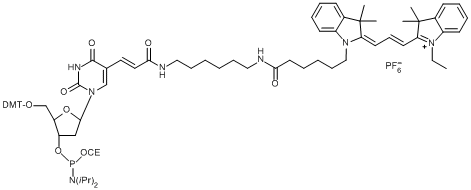Supports and reagents for therapeutic oligonucleotides
Supports and reagents for therapeutic, antisense, and SiRNA oligos. Also dyes and quenchers for bioassays.
Supports for Therapeutics Oligonucleotides
2’-O-Methyl- CPG contains nuclease resistant 2’-O-Methyl linkages to prevent degradation of the therapeutic oligonucleotide. These supports are available with fast deprotecting groups or standard protecting groups (shown) and are compatible with standard synthesis reagents. The fast deprotecting supports are compatible with base sensitive conjugates or 2’ Fluoro modifications.
Supports for Antisense Oligonucleotides
LGC Biosearch Technologies' standard base modified CPG supports can be used for the synthesis of antisense therapeutic oligonucleotides. They are offered in a variety of pore sizes from 500Å to 1000Å (500Å supports shown). These supports are available with either fast deprotecting groups or standard deprotecting groups and are compatible with standard protection methods used for antisense therapeutics. The smaller Å size supports will allow higher yields of smaller antisense oligo nucleotides.
Supports and Reagents for SiRNA Oligonucleotides
We offer RNA Supports and 3’ phosphate CPG for the manufacture of SiRNA oligonucleotides and oligonucleotide analogs. The RNA supports have a 2’ acetyl protecting group that is easily cleaved using standard deprotecting methods. The RNA supports and 3’ Phosphate support are available on 500Å CPG.
Dyes and Quenchers for Bioassays
LGC Biosearch has introduced our proprietary dyes and quenchers linked via thymine, which allows for more flexibility with your assay designs enabling alternate chromophore linkage arrangement. Our Black Hole Quencher® (BHQ®) dyes can be placed in the 3’; 5’ or internal position. LGC Biosearch dyes can be placed internally and in the 5’ position through a thymine base, which can participate in hybridization. Therefore, the dye and quencher can be incorporated into the oligo without the disruption of the phosphate backbone allowing expanded possibilities for probe design.
Quenchers

Dyes

